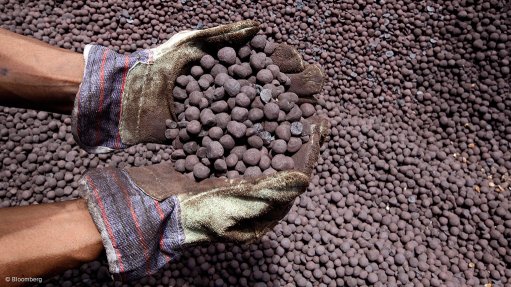Obama plan to shake up coal leases could restrict Trump
WASHINGTON – The outgoing Obama administration issued a blueprint for overhauling the way coal on federal land is sold, making it tougher for President-elect Donald Trump to resume sales under decades-old procedures.
The report released Wednesday lays out a menu of potential options for policy makers to consider, including tacking a carbon fee onto coal leases to account for climate change, requiring payments into a fund that could help out-of-work miners and devastated communities -- and even halting sales altogether.
This initial report is part of a reevaluation of the coal program announced by Interior Secretary Sally Jewell a year ago. It doesn’t prevent Trump from making good on his vow to overturn the Interior Department’s moratorium on new coal sales after being sworn in January 20. Trump can even disregard this report’s recommendations and stop the environmental review that was slated to take three years.
But the document bulks up a record of evidence that changes are needed -- information that would make it harder for future coal lease sales to withstand legal challenge.
EXHIBIT A
"If the Trump administration decides to just do business as usual, I think this will probably be Exhibit A in a future challenge," said David Hayes, a former deputy secretary of the Interior who is a visiting lecturer at Stanford Law School.
About 40% of US coal now comes from federal land, much of it from the Powder River Basin, in Wyoming and Montana. Demand for the fossil fuel and new federal coal leases has fallen as environmental regulations and competition from cheap natural gas encourage utilities to abandon coal-fired power. But because coal-fired power is the most potent source of carbon dioxide emissions, environmentalists argue government sales of the fossil fuel should account for the damage from those greenhouse gases.
Environmentalists already used litigation to press for a coal leasing overhaul, including a 2014 lawsuit by Friends of the Earth and the Western Organisation of Resource Councils. The groups appealed after a federal court dismissed their lawsuit in 2015, and that litigation was still ongoing when Jewell imposed the leasing halt.
LAWSUIT POSSIBLE
It could be revived -- or a fresh suit filed -- if Trump’s Interior Department abandons the environmental analysis wholesale and institutes new lease sales under the industry-friendly rules that date to the 1980s. Any future coal lease sale also could be challenged in court, with opponents arguing the transaction took place without environmental scrutiny the Interior Department concluded was necessary after holding five hearings and considering nearly 100 000 public comments.
"This will only strengthen the hand of those who are going to be pursuing reforms to the coal program through the courts," said Matt Lee-Ashley, a senior fellow with the Centre for American Progress. "It’s absolutely certain that whoever is challenging it will point directly back to this."
There’s precedent for such a challenge. Legal uncertainty clouded scores of Arctic drilling leases for years after a federal court ruled there were lapses in the environmental analysis that preceded a 2008 government auction of those tracts.
Jewell cast the leasing review as essential to updating the way the US government manages energy development on public lands. "The need to modernise the federal coal programme is unequivocal," Jewell said in an e-mailed statement. "The only responsible next step is to undertake further review and implement some of these commonsense measures."
Jewell said she could envision new coal lease sales if concerns highlighted by the report are addressed, during a discussion organised by Columbia University’s Centre on Global Energy Policy. But, she added, "it doesn’t make sense to do it on rules that are 30 to 40 years old, where we have been roundly criticised for not having a competitive process or a transparent process or one that gives a fair return for the American taxpayer."
Over 190 pages, the report offers a menu of possible changes meant to make sure government coal leasing is more efficient, better protects the air and water, accounts for greenhouse gas emissions and ensures a fair return to US taxpayers that own the resource. Each of the main three options includes a hike in the royalty rate. Several possible scenarios are outlined for further review, ranging from no change to adding a carbon fee to ending leasing entirely. One option included setting limits on the amount of coal that could sold during specific time periods, potentially limiting development and encouraging competition.
LAST SALE
The National Mining Association blasted the assessment, saying it shows the Obama administration had joined hands with environmental activists who preach a "keep it in the ground" mantra against fossil fuel extraction.
The "purported rationales to overhaul the federal coal lease programme rest on politically contrived reasoning that will result in less federal and state revenue, the loss of more high-wage jobs as well as an indispensable source of affordable electricity for millions of families," said the group’s president, Hal Quinn.
Steve Daines, a Republican senator from Montana, said the proposed changes "would jeopardise good-paying jobs and tax revenue that supports our schools, roads and essential services for our rural communities."
The government last sold a coal lease in October 2012 to BTU Western Resources. Antelope Coal asked to buy new territory in 2015, the first request for a sale in four years. The Bureau of Land Management currently administers 306 coal leases encompassing over 475 000 acres in ten states, with an estimated 7.4-billion tons of recoverable coal.
Advocates of a leasing overhaul hope to appeal to Trump’s promise to help out-of-work coal miners by arguing that reforms could steer aid their way. Half of the US government revenue from federal coal leases already goes to the states; increases in royalties could allow more money to go to hard-hit mining towns.
"If the Trump administration reaction is to put this analysis in the wastebasket, in a very real sense, they would be denying the reality of the need to address the economics of the industry, including how best to help the communities that are suffering because of the changing economics of the industry," Hayes said.
Comments
Press Office
Announcements
What's On
Subscribe to improve your user experience...
Option 1 (equivalent of R125 a month):
Receive a weekly copy of Creamer Media's Engineering News & Mining Weekly magazine
(print copy for those in South Africa and e-magazine for those outside of South Africa)
Receive daily email newsletters
Access to full search results
Access archive of magazine back copies
Access to Projects in Progress
Access to ONE Research Report of your choice in PDF format
Option 2 (equivalent of R375 a month):
All benefits from Option 1
PLUS
Access to Creamer Media's Research Channel Africa for ALL Research Reports, in PDF format, on various industrial and mining sectors
including Electricity; Water; Energy Transition; Hydrogen; Roads, Rail and Ports; Coal; Gold; Platinum; Battery Metals; etc.
Already a subscriber?
Forgotten your password?
Receive weekly copy of Creamer Media's Engineering News & Mining Weekly magazine (print copy for those in South Africa and e-magazine for those outside of South Africa)
➕
Recieve daily email newsletters
➕
Access to full search results
➕
Access archive of magazine back copies
➕
Access to Projects in Progress
➕
Access to ONE Research Report of your choice in PDF format
RESEARCH CHANNEL AFRICA
R4500 (equivalent of R375 a month)
SUBSCRIBEAll benefits from Option 1
➕
Access to Creamer Media's Research Channel Africa for ALL Research Reports on various industrial and mining sectors, in PDF format, including on:
Electricity
➕
Water
➕
Energy Transition
➕
Hydrogen
➕
Roads, Rail and Ports
➕
Coal
➕
Gold
➕
Platinum
➕
Battery Metals
➕
etc.
Receive all benefits from Option 1 or Option 2 delivered to numerous people at your company
➕
Multiple User names and Passwords for simultaneous log-ins
➕
Intranet integration access to all in your organisation


















